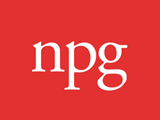
Nature Publishing Group (NPG) today introduces the Creative Commons Attribution (CC BY) license on its 19 NPG-owned academic journals. From December 2012, the CC BY license will be available to authors choosing open access publication options in these journals, in addition to the two non-commercial Creative Commons (CC) licenses currently on offer. This follows NPG’s introduction of a CC BY license option on Scientific Reports in July 2012.
Effective 1 April 2013, Wellcome Trust and RCUK funders will require a CC BY license when they pay open access article processing charges (APCs). NPG intends to offer CC BY options on further open access and ‘hybrid’ journals over the next few months, in keeping with its commitment to author choice and meeting the needs of funders and the research community.
“We are pleased to offer authors the choice of the CC BY commercial reuse license when publishing their work in any of the academic journals that we own,” said Martin Delahunty, Associate Director, Academic Journals & Pharma Solutions, NPG. “Our self-archiving policy remains in place on all our journals and is compatible with both policies, offering authors a ‘green’ open access route to compliance without payment of any APC.”
The journals introducing the CC BY license are: Blood Cancer Journal; Bone Marrow Transplantation;Cancer Gene Therapy; Genes and Immunity; European Journal of Clinical Nutrition; Gene Therapy;International Journal of Obesity; International Journal of Impotence Research; Journal of Exposure Science & Environmental Epidemiology; Journal of Human Hypertension; Journal of Perinatology;Leukemia; Molecular Psychiatry; Nutrition & Diabetes; Oncogene; Oncogenesis; Prostate Cancer;The Pharmacogenomics Journal; Translational Psychiatry.
The CC BY license allows for articles to be distributed and amended, including for commercial opportunities. Papers can be developed upon, as long as attribution is given to the original work and its authors.
An APC is levied per article accepted for publication for authors choosing to make their work open access. Authors choosing the CC BY license will pay a premium APC. Full details will be available on nature.com in December and are listed below.
“We want to encourage more researchers to make their articles accessible, and maximise reuse, by giving authors a choice of licenses they can be comfortable with,” said David Hoole, Marketing Director, NPG. “Since the introduction of CC BY on Scientific Reports, our authors have continued to select all three CC licenses, and we’re committed to offering that choice. The price differential fairly represents NPG’s loss of exclusive commercial rights, specifically reprints income.”
NPG publishes 60 journals that are open access or have an open access option. 58 of its 62 academic and society publications (94%) have introduced open access options or are open access journals.

























